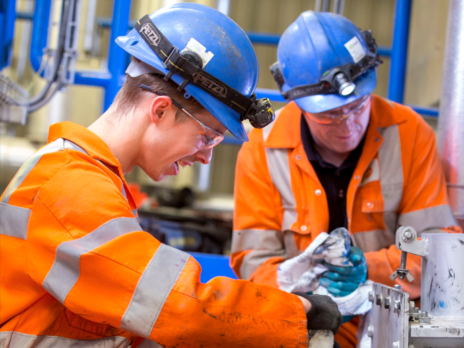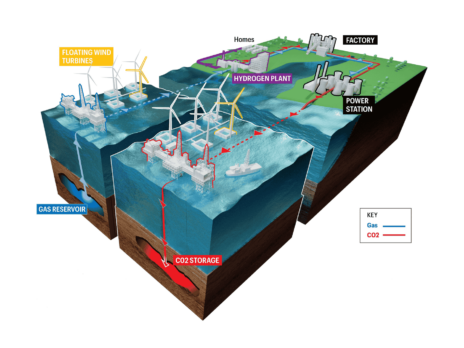
After four months getting used to being an elected MP – give or take a few weeks of summer recess and party conference season – Carla Denyer, the co-leader of the Green Party, is still adjusting to the antiquated workings of parliament. Or, as House of Commons fanatics may term it, the “traditions” of the lower house.
“I’ve got no problem with tradition if it is bringing value or joy, or a sense of continuity, but where it is actively getting in the way of us doing democracy, well, I think we need to look at it again,” Denyer, the MP for Bristol Central, told me when I met her on a bright, mild October morning. Her office is located in parliament’s Richmond House, a Grade II-listed building constructed in the Eighties. Denyer’s space is a mix of the old parliament and new: my pine-green chair was missing an arm, while the room’s exposed Bourbon-biscuit brickwork was accompanied by sleek black window fittings and a parliamentary assistant three weeks into her new role quietly typing away in the background.
Key among the Green politician’s gripes with Westminster – well-documented issues with heating, fire safety and vermin aside – are the prayers held at the beginning of each day of parliamentary business (“Not exactly fitting with our multi-faith society”), and the convoluted procedure of putting forward a private members’ bill (“You do that by signing your name in a book… and they draw little white balls out of a glass jar like in the Lottery”).
But the process of getting on a select committee, both for those covering specific bills and those that shadow government departments, is perhaps her most pertinent annoyance. On the former, Denyer had just received confirmation that she had secured a place on the Renters’ Rights Bill Committee; the process was rather whimsical, she explained: “The way we do that is ‘fastest finger first’ on emails.” For the departmental committees, she added, Labour, the Conservatives and the Liberal Democrats are guaranteed a proportional number of seats on each, leaving one seat for the other parties to fight over through the “usual channels”.
Though final places had not been allocated when we spoke, Denyer said she was “hopeful” that at least one of the four Green MPs would be accepted on to a main select committee. “Especially as a smaller party, whether you get a place on a committee – and therefore the ability to take part in the detail of policymaking – seems to be as much to do with who and what you know, as well as fear and favour, as it is to do with proportionality.”
It speaks to a central question that overshadowed the initial delight of the Green Party quadrupling its previous parliamentary representation in July: how much impact can four MPs really have on a policy area such as climate and sustainability? I put that question to Denyer.
“We’ve been very active,” she said, cutting a relaxed figure sitting crossed-legged on a dark green sofa. “We can ask the questions and put things on the agenda, and I do think that we will, over the next few years, be able to push the government to go further.”
She raises an example of Green influence outside of the traditional climate-and-sustainability axis: pressure on Chancellor Rachel Reeves to increase capital gains tax in the Budget. In their election manifesto, the Greens called for “radical” adjustments to taxes, including the raising of capital gains to be in line with income tax. Unsurprisingly, perhaps, Reeves didn’t quite go as far as Denyer’s party wanted, but capital gains tax rates did go up.
“While I’m definitely not claiming sole credit for that,” she said prior to the Budget, “[it’s] evidence that the Greens can push the Overton window,” referring to the range of policies which are deemed acceptable to the mainstream. “I would rather have Greens in government so that we were the ones delivering the policies ourselves… but in the meantime, supporting the Labour government in areas where I think they’re doing well, but pushing them to go further – that’s my job.”
[See also: Carla Denyer: Greens will pressure Labour from the left]
Though it has been a stuttering start for the new government, if there is one area in which Labour can take credit, it is the swift action taken by the Department for Energy and Net Zero on green policy. Led by the Energy Secretary, Ed Miliband, Labour has lifted the effective ban on the construction of onshore wind farms (a David Cameron-era legacy); halted new North Sea oil and gas licences; launched a £7.3bn National Wealth Fund for green infrastructure; and set up the state-run investment company GB Energy.
“I’m really interested in what happens with Great British Energy,” Denyer said. “That’s a potentially good idea.” But she has misgivings, too, including about the ownership split between the government and private-sector investors. “What kind of projects is Great British Energy going to be investing in? If it ends up being mostly nuclear and carbon capture and storage, then I’ve got concerns.” Two weeks prior to our conversation, Labour announced £22bn of public funding over 25 years for two carbon capture clusters, on Merseyside and Teesside. The government said the clusters would attract £8bn of private investment and directly create 4,000 jobs, and support 50,000 in the long term.
Denyer had praise for one of Labour’s ambitions: to completely decarbonise the electricity grid by 2030 (“Yeah, that’s our policy too”). “But actually, it’s… heating and transport that are the trickier things to decarbonise,” Denyer said. “I would like to hear more from the Labour government about how they’re going to decarbonise transport, building, heating, energy efficiency and so on. The [annual] £28bn climate pledge that they rowed back on before the election – those cuts fell largely outside of electricity [decarbonisation projects], so my concern is they’ve cut the funding for that. We’re not going to get to net zero without those areas, and government needs to focus on them.”
In a recent interview with the New Statesman, Miliband said that his department’s mantra was to “move fast and build things, rather than move fast and break things”, in an inversion of the Silicon Valley cliché.
It was over GB Energy-backed plans to build a 114-mile electricity-pylon route partly through the East Anglian constituency of Adrian Ramsay, Denyer’s fellow party leader, that Labour and the Greens clashed in the Commons. Ramsay backed his constituents’ calls to consider “other options”, such as costlier underground infrastructure. In a parliamentary debate that followed, Miliband said: “I would ask that the Green Party thinks about its commitment to tackling the climate crisis, which we all share, and then thinks about this question of infrastructure. If it wants to tackle the climate crisis, it should know that that simply will not happen if its leading members say no to new energy infrastructure.”
Cameras caught Denyer, unable to formally respond to the political mic-drop moment, looking unimpressed. She remains so. Given the government promised to “not steamroller communities” (Denyer’s words), Miliband was unfair in framing Ramsay’s concerns through a not-in-my-back-yard lens. Denyer believes Miliband’s response was purely partisan.
“[In the] constituency neighbouring Adrian’s, the Labour MP for South Norfolk has taken exactly the same position on this pylon route as Adrian, and yet, you haven’t heard about this. You probably don’t even know that MP’s name.” (Denyer is referring to the stance taken by Ben Goldsborough).
“And yet Ed Miliband certainly didn’t get up at the despatch box and berate him publicly for taking the same position,” Denyer added. She believes Miliband’s defensiveness is a result of feeling “threatened by the growth of the Greens in the last election”.
“I was a bit disappointed to hear him just reeling off the standard attack line he’d clearly been handed by the Labour Party press office,” Denyer said while affirming her “respect” for Miliband. Earlier in our conversation, she said that she felt sorry for him: “He has the right ideas about what needs to happen, but is constrained by decisions being made in the Treasury and by the Prime Minister.”
Prior to joining parliament, Denyer worked as a renewable energy engineer specialising in offshore and onshore wind. Spend time with her – we had previously spoken on the general election campaign trail back in July – and it won’t take long for her knowledge about, and enthusiasm for, all things climate to become apparent.
As we discussed Cop29, to be held later this month in Azerbaijan, Denyer hopped off her sofa to show me research highlighting how money given in aid to the countries in the Global South is eclipsed by their collective debt repayments. “In 2023, African countries spent over 50 times more on external debt than they received in aid from the UK,” Denyer read from the screen. “If we’re not helping them with debt – restructuring debts – then why are we bothering to give them aid?”
The Baku event has been dubbed the “finance Cop”, and the Green co-leader believes wealthy countries must use it to pledge vast monetary support – “We’re talking trillions, not billions” – to make sure that those living in countries already experiencing climate-related disasters are not left behind.
After the previous Conservative administration pushed back the introduction of carbon-reduction measures, Denyer expressed concerns about the UK government’s legally binding responsibility to reach net zero emissions by 2050. Is Labour going in the right direction? While acknowledging that the government is doing a good job investing in renewables, Denyer added: “If you’re allowing new fossil fuel projects to open at the same time, you’re not going to get to net zero… Building more renewable projects and opening more oil and gas projects like Rosebank” – an oil field off the Scottish coast set to open in 2026-27 – “is like having a salad alongside your Big Mac and thinking that it’s a healthy meal.”
[See also: What’s behind the Green Party surge?]
Though Denyer clearly has her sights set on Labour, what of the Greens? While her growing status has made her the subject of glowing profiles in the likes of British Vogue, Elle and Cosmo, a recent interview for another political weekly was less sympathetic.
It termed her “the most ignored woman in British politics”, suggesting the Greens risk being dismissed as “a hard-left” protest vote. “How can it broaden its appeal?” the subheadline asked. Denyer considered the question: “Well, the fact that in the election we got a record-breaking number of MPs elected – but also record-breaking vote share, number of second places [40], and number of deposits retained – shows that there is a huge potential for further growth. “We’re really grateful for the level of support we’ve received, and we will, as four MPs, try to turn that into action and pressure on the government. But this isn’t a high watermark.”
This article first appeared in our print Spotlight report on Sustainability, first published on 8 November. Read it here.




